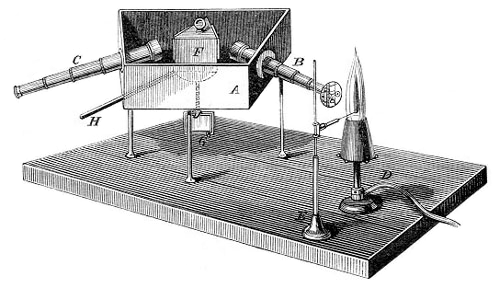Bunsen, Robert Wilhem → Bunsen, Robert Wilhem
Robert Wilhem Bunsen (1811-1899) is a German chemist who held professorships at Kassel, Marburg and Heidelberg. His early researches on organometallic compound of arsenic cost him an eye in an explosion. Bunsen's most important work was in developing several techniques used in separating, identifying, and measuring various chemical substances. He also improvement chemical battery for use in isolating quantities of pure metals - Bunsen battery.
The essential piece of laboratory equipment that has immortalized the name of Bunsen was not invented by him. Bunsen improved the burner's design, which had been invented by Faraday, to aid his endeavors in spectroscopy. Use of the Bunsen burner in conjunction with a glass prism led to the development of the spectroscope in collaboration with the German physicist Gustav Kirchoff and to the spectroscopic discovery of the elements rubidium (1860) and cesium (1861).

cetane number → cetanski broj
Cetane number is a measure of the ignition quality of diesel fuel. It denotes the volume fraction of cetane (C16H34) in a combustible mixture (containing cetane and 1-methylnapthalene) whose ignition characteristics match those of the diesel fuel being tested. Cetane is a collection of un-branched open chain alkane molecule that ignites very easily under compression, so it was assigned a cetane number of 100, while alpha-methyl naphthalene was assigned a cetane number of 0.
control rod → kontrolna šipka
Control rods are rods in a nuclear reactor composed of substances that absorb neutrons (cadmium, hafnium, boron, etc.). These rods regulate the power level of the reactor.
natural gas → prirodni plin
Natural gas is a naturally occurring mixture of gaseous hydrocarbons. The approximate composition of natural gas is 85 % methane, 10 % ethane, 3 % propane, with lesser amounts of butane, and other higher alkanes. Natural gas is used as a fuel and for the manufacture of chemicals.
octane number → oktanski broj
Octane number is the assay mark of the liquid motor fuel which shows its anti-knock value. n-heptane, which detonates very easily, has o.n. 0, whereas isooctane, which does not detonate, has o.n. 100. By mixing these hydrocarbons we obtain fuels of different qualities, with values of octane number between 0 and 100.
radiation damage → radijacijsko oštećenje
Radiation damage is a general term for the alteration of properties of a material arising from exposure to ionising radiation (penetrating radiation), such as X-rays, γ-rays, neutrons, heavy-particle radiation, or fission fragments in the nuclear fuel material.
Citing this page:
Generalic, Eni. "Gorivi članak." Croatian-English Chemistry Dictionary & Glossary. 29 June 2022. KTF-Split. {Date of access}. <https://glossary.periodni.com>.
Glossary
Periodic Table

